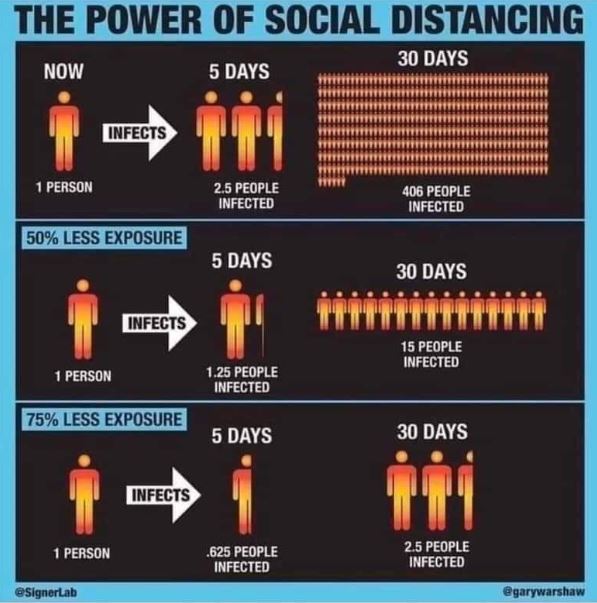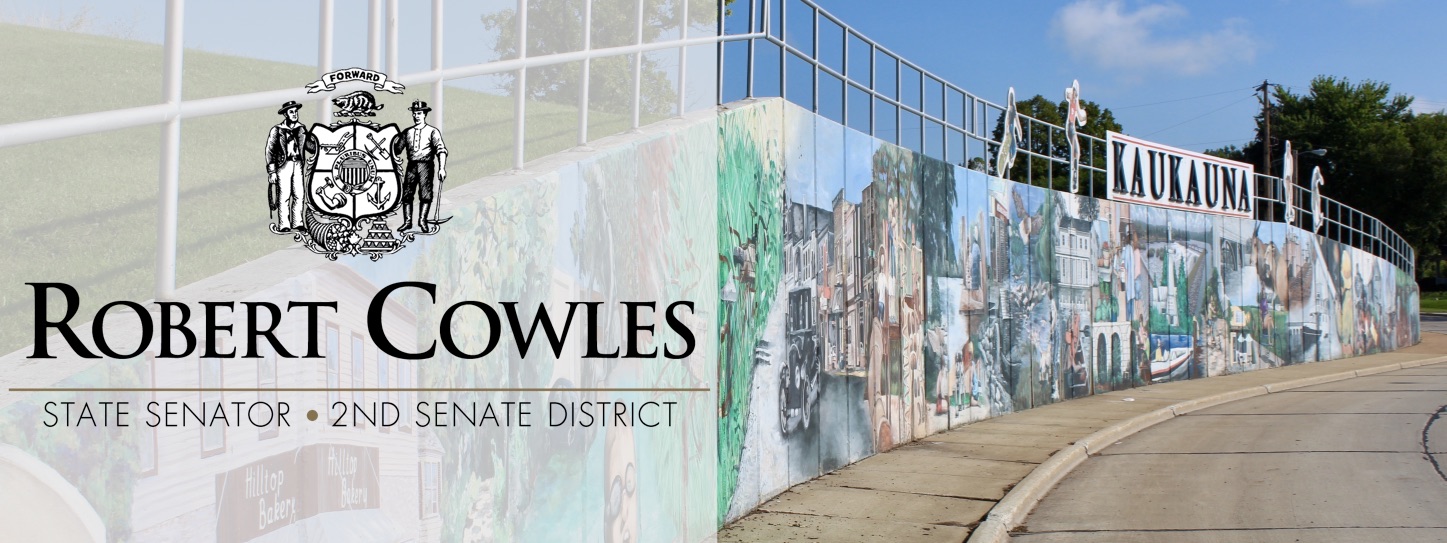|
Dear Friends and Neighbors,
While it may seem like months, it’s now been just a few
weeks with the COVID-19 outbreak spreading in Wisconsin.
According to state health officials, the changes we’ve
made to our daily routine are having a positive impact
as we’re beginning to see a flattening of the curve. As
we continue adapting to our temporary new normal, I
wanted to take some time to provide some updates on the
state’s response to COVID-19 and offer links to
resources with more information to help everyone
navigate this unprecedented circumstance.
Unemployment Benefits and Insurance Coverage
With the effects of the Safer at Home order being felt
throughout Wisconsin, unemployment claims have
unfortunately been on the rise. If you’re facing
joblessness during this crisis and have questions
regarding unemployment benefits, I’d encourage you to
visit this page of frequently asked questions put
together by the state Department of Workforce
Development (DWD). On the page, you can find a link to
apply online.
About 98% of claims can be completed entirely online.
Just this morning DWD Secretary Caleb Frostman, speaking
to a large group of Wisconsin businesses, continued to
strongly encourage online applications because they are
more efficient. However, some claims may require
follow-up by phone. DWD phone lines remain busy because
of the volume of claims, so if you find yourself siting
on hold for hours at a time, my office may be able to
help constituents of the 2nd Senate District connect
with an Unemployment Insurance representative. Please
feel free to contact my office if you are having
troubles with unemployment claims.
The loss of a job doesn’t just mean the loss of an
income. Some residents and families may deal with the
loss of health insurance coverage. The state Office of
Commissioner of Insurance (OCI) has created a frequently
asked questions document for individuals who have lost
their health coverage. The document covers different
options for health insurance, including the individual
marketplace, BadgerCare Plus, and the ability to retain
employer-based coverage, along with links for additional
information on these options. You can find
this information on
OCI’s website.
Child Care Options
The closure of schools and some daycare providers has
been hard enough for those in Northeast Wisconsin who
are able to work remotely due to the pandemic. But for
those who continue going to work and helping our state
fight this pandemic, the lack of childcare options can
be devastating.
The state Department of Children and Families recognized
this challenge, and has established a website for
‘essential employees’ looking for daycare services. You
can enter your information to be connected with options
on
ChildCareFinder.Wisconsin.gov.
Assistance for Employers
Small businesses suffering losses from the outbreak of
COVID-19 have been faced with difficult decisions in the
past few weeks. While these losses are very difficult,
I’ve been pleased to see steps towards relief offered by
the Wisconsin District Office of the federal Small
Business Administration.
This includes the Paycheck Protection Program which was
recently enacted into law by the federal government.
This program helps small businesses, including farmers,
to make it through these trying times while keeping
their workforce employed. This assistance varies from
the Economic Injury Disaster Loan program, which I’ll
discuss below, as the business may be subject to loan
forgiveness or grants. Learn more about this program on
the following websites:
If you’re a business owner who’s been faced with the
difficult choice of layoffs already, Economic Injury
Disaster Loans are still an option even if you can’t
qualify for the Paycheck Protection Program. This
program is outlined, along with links on the application
process, on the
Wisconsin Economic Development Corporation’s webpage
dedicated to COVID-19. Additionally, if you’re
interested in this small business disaster loan, I would
further encourage you to review
this fact sheet on the loans from the Small Business
Administration and find further information on applying
to this program may be found
here.
The Small Business Administration has been hard at work
to try to clarify the information about these loans,
including putting out a
frequently asked question sheet for faith-based
organizations, providing this information in multiple
languages on
their website, and offering regular webinars to
learn more about these resources (you can learn about
these webinars in advance by signing up for emails from
the Wisconsin Office of the Small Business
Administration on
their website). If you reach out for assistance
directly to SBA please be aware they are handling a
number of inquiries at this difficult time. Please be
patient and as always, you can reach out to my office if
you are running into unsurmountable problems.
Finally, if you’re finding it difficult to navigate
these different programs, Wisconsin Manufacturers and
Commerce has created a COVID-19 Employer Toolkit that
can help local businesses and workers navigate the
various state and federal resources available. The Toolkit also covers
some of the various changes made during these unusual
times. You can find this toolkit on
their website.
Personal Protective Equipment
Personal protective equipment (PPE) is crucial in the
fight against COVID-19 to reduce the risk to medical
professionals and other health care providers working
tirelessly to help our communities. But as the need for
PPE has gone up, the state has taken steps to increase
the supplies available to Wisconsin’s doctors, nurses,
first responders, and other frontline providers.
This includes requests from the Strategic National
Stockpile. Three rounds of requests have been fulfilled,
with the latest coming just yesterday. These shipments
have provided 167,700 N95 respirators, 623,400 surgical
masks, 79,000 face shields, 108,600 surgical gowns,
2,200 coveralls, and 377,500 gloves.
The state has also established a website where
individuals and businesses can donate personal
protective equipment in quantities of 50 items or more.
If requested, the state can also offer to buy these
goods at face value. If you have PPE that you’re
interested in providing, please visit
this website.
Receiving PPE is a start, but we also need to make sure
this equipment is being distributed to the front lines
in our hospitals, long-term care centers, and
firehouses. I’ve been working with the state Department
of Health Services to determine how they are
distributing this gear, and I’m pleased to know that
they have recently set up a system where health care
providers can request this equipment online.
By ensuring that providers are informed about the steps
to request supplies, using a formula where they can
maintain an equal distribution of goods, and ensuring
that the state hand delivers the PPE, we can continue to
help doctors, nurses, and first responders stay safe
during this outbreak.
Prevention Steps
I know everyone’s heard about the preventions steps
recommended by state and federal health officials
before, but frequent reminders can help us to
subconsciously work these into our daily routines. These
measures to help slow the spread of COVID-19 should be
used by everyone, not just those who are symptomatic,
and are the best way that you can help our communities
to fight this outbreak.
-
Wash your hands often with soap and water for at
least 20 seconds, and use hand sanitizer between
hand washings
-
Avoid touching your eyes, nose, and mouth
-
Cough into your arm and cover sneezes with a tissue,
then throw the tissue away and wash your hands
-
Consider following
CDC’s new recommendations by wearing a mask in
public, but preserve N95 masks for health care
professions (learn how to make your own mask at home
without sewing
here)
-
Avoid close contact with others, even if they’re not
currently ill (known as ‘social distancing’
-
Stay home, especially if you’re sick or if you may
have a compromised immune system
-
Clean and disinfect frequently handled objects and
touched surfaces (such as cell phones)
The graphic I’ve included below really helps to
demonstrate the importance of social distancing during
this outbreak:

Feedback on Conservation Questions
Looking to help limit public gatherings and reduce the
spread of COVID-19, the state Department of Natural
Resources (DNR) has decided to move the annual
Conservation Congress meeting online. A Wisconsin
tradition, in past Aprils thousands of engaged citizens
would look forward to attending one of 72 Conservation
Congress hearings around the state to vote on advisory
questions related to natural resources management and
sporting heritage. This year, instead of in-person
hearings on April 13th, citizens will be able to provide
input online over the course of a 72-hour period
starting on next Monday, April 13th. To learn more about online participation and to
find the most up-to-date information on these changes,
please visit the
DNR's website.
DNR Closes Some State Parks
After waiving State Park admission fees during this
pandemic a couple of weeks ago, the surge of visitors to
State Parks in the southern region of our state lead to,
according to the Department of Natural Resources (DNR),
overcrowding, excessive amount of litter, and some cases
of vandalism. That led the DNR to closing forty State
Parks and Forests yesterday, with most of them being far
from the 2nd Senate District.
One State Park in Northeast Wisconsin, High Cliff, was
closed under this order. I understand the necessity to
protect our State Parks and their visitors, but I was
also concerned about the impact to resident’s outdoor
recreation, which is perhaps more important now than
ever for both mental and physical health. You can see a
full list of closures on the
DNR’s website.
That’s why I spoke to DNR Secretary Preston Cole
yesterday to learn more about this decision. I was
astonished to learn that just last weekend, 16,000
people visited High Cliff State Park. Even under the
best of circumstances with people attempting to practice
social distancing, this is bound to lead to
overcrowding.
I told the Secretary that I understand the public health
necessity of this decision, but I also implored him to
work with the state Department of Health Services to
search for ways that we can reopen some State Parks,
perhaps with quotas of the number of people allowed in
at a time, so Wisconsinites can safely enjoy some time
outdoors during this outbreak while minimizing the risk
of spread of COVID-19 and protecting the integrity of
our beloved State Parks.
Essay Contest Highlighting Local Businesses
As I mentioned in the last e-newsletter, dozens of local
businesses are stepping up to meet today’s new
challenges. With everything from food and household
goods production, to the manufacture of medical supplies
which sometimes requires retooling production and
equipment, and the continued transport of all of these
items, there’s just too many stories to be able to share
them all. Thank you to all the businesses stepping up in
this trying time!
The Wisconsin Business World is asking area middle and
high school students to help share more of these stories
by hosting an essay contest with cash prizes for the top
essays. If you have a student at home, this is a great
opportunity to have them learn more about the remarkable
work being done close to home during this global
historical event. Learn more about this contest
here.
Seeking Help in these Difficult Times
The changes to our everyday lives in recent weeks,
intensified by the constantly changing news cycle can
cause anxiety, stress, and fear among Wisconsin
residents. If
you’re facing these issues, please know that you’re not
alone. The state Department of Health Services has
established a website known as ‘Resilient Wisconsin’
where you can learn more about how to cope with the
COVID-19 outbreak and find resources for additional
help.
The American Foundation for Suicide Prevention has also
established a webpage titled ‘Mental Health and
COVID-19’ where you can find advice and guidance and
view public messages meant to help us all make it
through these difficult times.
Lastly, please know that we are all in uncharted waters
and individuals will find different coping mechanisms to
deal with our current situation. Even in your own
household your family members may be dealing with
varying degrees of stress and anxiety and in very
different ways. Try to understand each other and support
those closest to you.
Thank You!
To the doctors and nurses, firefighters and EMTs, public
health sectors employees and researchers, truck drivers,
daycare providers, law enforcement officers, farmers,
custodial staff and sanitation works, grocery store
employees, and so many more, thank you for the part
you’re playing to help our communities get through this
outbreak!
The gratitude our communities owe to our neighbors
playing a critical role in this fight cannot be
expressed enough.
Happy Easter
While it’s a couple of days early, I want to wish
everyone a Happy Easter! While this year may not be
quite the same, Sunday still offers an opportunity for
celebration, reflection, and quality time with members
of your household.
As we near the end of Holy Week, a sacred tradition for
people of Christian faith in Northeast Wisconsin, the
changes this year have been evident. Fortunately,
religious communities of all faiths have adapted to
these difficult times through virtual or drive through
services. I’d like to applaud the Diocese in Green Bay
and the many other faiths that have taken proactive
steps to protect parishioners while maintaining a sense
of community during this unusual time.
Until Next Time
My staff and I continue to remain available to assist
with questions you may have involving state government
during this difficult time. While we may not always have
the answer right away, we’ll do our best to assist with
your questions and concerns revolving around COVID-19 or
other issues related to state government.
To find the most up-to-date information on the
Governor’s actions, including the ‘safer at home’ order,
along with each state agency’s role in this outbreak,
I’d encourage you to visit
this
website. You can also find the information I’ve
shared in my previous e-newsletters.
And as always, please feel free to
contact my office with any questions or concerns you
may have, and be sure to visit
my website and connect with me on
Facebook,
Twitter, and
Instagram for regular updates on Coronavirus and
more from around the
2nd Senate District and in the State Capitol.
Thanks for reading!

Senator Robert Cowles
Proudly Serving Wisconsin's
2nd Senate District
|

